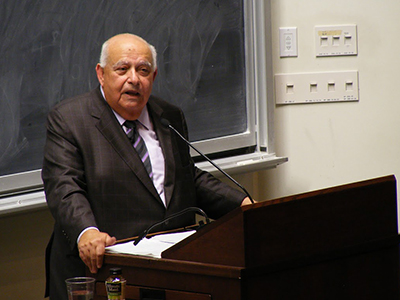
January 21, 2014
Gillian Philipupillai
At the invitation of the University of Toronto’s Egyptian Students Association, Professor Adel Sedra, a former Chair of ECE from 1986-1999, delivered a Distinguished Lecture to an audience including his former U of T Engineering colleagues and students. Also in attendance was Professor K.C. Smith, Professor Sedra’s own graduate supervisor and co-author of Microelectronic Circuits, their famed textbook that is taught worldwide and has sold over 1 million copies.
“I consider myself a ‘lifer’,” Professor Sedra joked, explaining that he has spent 55 of his 70 years “hanging around Universities.” “Hanging around,” is of course a rather modest description for an academic career that included 25 years in academic leadership positions. After serving as Chair of ECE, Professor Sedra served as the Provost of U of T until 2002 and joined the University of Waterloo as dean of its Faculty of Engineering in 2003.
Professor Emeritus Safwat Zaky, also a former chair of ECE and Professor Sedra’s roommate while they were graduate students in ECE, introduced the lecture. Professor Zaky remarked on Professor Sedra’s “special rare ability to peel away layers of complexity in any problem and see the underlying basic principles.” This ability helps explain his success in understanding both circuits and academic governance systems, said Professor Zaky. Reflecting on Professor Sedra’s years as Provost, Professor Zaky described his tenure as “simply transformative.”
In his lecture, Professor Sedra traced his understanding of the interaction between research and teaching to his experiences as a fourth-year undergraduate student using transistors in his final design project at a time when knowledge about them was very limited. He noted that he was fortunate to work with a faculty member who was involved in ongoing research on transistors. This experience was formative in Professor Sedra’s interest in microelectronics, as well as his lifelong obsession with the nexus between teaching and learning that defines the research university. According to Professor Sedra, the ability to unite teaching and research characterizes a successful professor. “The final product for me,” Professor Sedra said, “was always better understanding.”
“Setting teaching and research as conflicting tasks misses the point of what a university is all about,” Professor Sedra said, noting that in 1994 as Provost he made the integration of teaching and research a central theme for the University. He also described a fully-functioning faculty member as one who “teaches undergraduate and graduate students, supervises graduate students, helps run the university, and of course does research.”
Professor Sedra’s career and achievements have inspired many current students. Mohamed Abdelfattah, a PhD student in ECE, is president of the Egyptian Students Association and organizer of Professor Sedra’s lecture. Abdelfattah noted that seeing how someone from the same background as him had become the world authority in microelectronics instilled in him the determination to work hard. Hazem Soliman, also a PhD sudent in ECE concurred: “I graduated from the same University as Professor Sedra—Cairo University. My profs used to tell us, ‘The author of this book was sitting right in your place!’”
After an academic career which has spanned half a century, Professor Sedra’s continued enthusiasm, passion, and commitment to higher education remains evident. “I can’t think of a better career than an academic one,” he advised current students. “There is no better cause than the cause of higher education,” he further remarked, “higher education is the great equalizer. “ “Whatever time I have left in my life,” Professor Sedra concluded, “I’ll continue to hang around universities and enjoy it.”
More information:
Gillian Philipupillai
Communications Assistant
The Edward S. Rogers Sr. Department of Electrical & Computer Engineering
416-978-1999; gillian.philipupillai@utoronto.ca